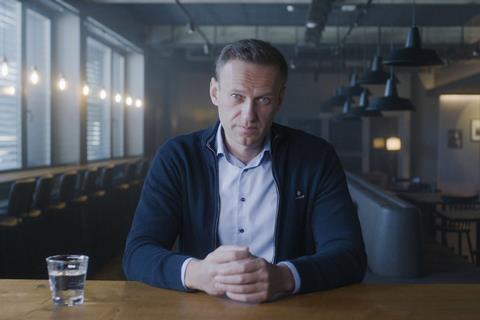Alexei Navalny goes behind the plot to murder Alexei Navalny: Daniel Roher follows with his camera in Sundance’s secret title

Dir. Daniel Roher. US. 2022. 98 minutes.
There’s very little physical distance between documentarian Daniel Roher - taking a more journalistic than artistic approach - and his subject, Russian dissident and Putin public enemy No 1, Alexei Navalny; no space to hide between Roher’s camera and Navalny’s direct, charismatic forcefulness. Nor, either, is there much time between now and the events which take place in Navalny. The climactic moments occurred almost exactly a year ago, on an airplane full of masked people on the way home to Russia. This gripping, muscular piece is markedly immediate - like its subject, who lives for the moment, in the constant shadow of his own death.
One of the most brazen incidents of state sponsored assassination in memory
Formerly a Presidential candidate, Navalny was poisoned by the military-grade nerve agent Novichok in remotest Tomsk, Siberia in August 2020, yet miraculously survived to uncover the plot against him with the help of citizen-journalist Christo Grozev from Bellingcat (“a very nice, kind, Bulgarian nerd with a laptop,” says Navalny.) Roher’s cameras are there throughout: extraordinary footage of the events surrounding the poisoning and the investigation are cut together with a long interview with Navalny, and footage taken with his wife and children in exile in Germany. Casually honest and physically prepossessing, Navalny comes across as forceful, courageous - determined to jump heedlessly into his own destiny. As a journalist notes, he’s half a reporter himself, with a giant online presence (including 30 million YouTube followers and a mastery of Tik-Tok), and a slim, slick team which has Russian corruption - no less - in its sights.
A last-minute inclusion at Sundance, where it won the audience award in both the US documentary competition and for the overall festival, the secretly-shot Navalny arrives at a point of extreme geo-political turbulence to remind the world of the truth of the term ‘Putin’s Russia’: it’s unlikely the timing is accidental as events in Ukraine escalate. For that, it will be noticed - it has already been picked up by CNN/HBO, with Dogwoof handling world theatrical. Yet Navalny is more than the context of its release. Enormously accessible - which not every documentary on recent Russian politics has been - Navalny has all the drama of a spy novel, more in fact. It has been edited for pace and immediacy, yet it doesn’t come across as contrived. It’s also lump-in-the-throat stuff. Ending (a little too loosely) on a series of titles which will undoubtedly have to be changed as events progress, it should achieve Navalny’s ambition of reaching out to wide - and new - audiences.
For all his defiant courageousness, Navalny’s main fear is that Roher’s film is for “after I get whacked”. It’s something he doesn’t want to think about, that Navalny may be his epitaph, even as he does everything he can to poke the Russian bear in the eye. Navalny is physically imposing, and his swift recovery from the jaws of death seems to match his outsize sense of destiny and blind courage marching towards it. It’s not all politics, though. Navalny also spends a lot of time with the dissident’s family: his impressive wife Yulia, who faces down the police and is constantly at his side, and their teenagers Dasha (aged 19) and younger son Zahar. It’s all very human, sometimes funny (the idea of state incompetence they nickname ‘Moscow4’ would be hilarious if it wasn’t so true) and, at the same time, reaches for something else entirely. Is it change, power or immortality?
Navalny has a close-knit and competent team, led by Maria Pevchikh, who checks in throughout the interview. He answers everything, including questions on his past associations with the far-right in Russia. He’s not exactly patient, and it seems like he always knows he hasn’t got time to waste. Roehr is not a particulary tough interviewer, but neither is he an acolyte: there’s a point where it becomes clear that a revelation Navalny has been searching for will result in another man’s certain death. Roher just lets that sit with the audience. But Navalny is quickly on the move again, and the film with it - it’s not so much that Roher is entranced by Navalny, but the documentary is clearly following the politicion’s narrative. The fact that it involves one of the most brazen incidents of state sponsored assassination in memory means this is a unique document of a very singular man.
Production companies: Cottage M
International sales: Dogwoof
Producers: Shane Boris, Diane Becker, Odessa Rae
Cinematography: Niki Waltl
Production design:
Editing: Langdon Page, Maya Daisy Hawke
Music: Marius deVries






![The Brightest SunScreen[Courtesy HKIFF]](https://d1nslcd7m2225b.cloudfront.net/Pictures/274x183/3/5/0/1448350_thebrightestsunscreencourtesyhkiff_312678.jpg)















![The Brightest SunScreen[Courtesy HKIFF]](https://d1nslcd7m2225b.cloudfront.net/Pictures/100x67/3/5/0/1448350_thebrightestsunscreencourtesyhkiff_312678.jpg)











